She’s been bullied, suffered anxiety and an eating disorder, but that hasn’t stopped a Hobart oncology nurse from becoming one of the state’s finest distance runners – and now she’s using her ability to overcome adversity to help others.
The now 22-year-old moved to Sydney with her family when she was just four years old and has been living in Tasmania since she was 10.
But that hasn’t stopped bullies from taunting her, simply because she’s a Muslim who chooses to wear a hijab.
Daoui, who lives with her parents and her three younger siblings in Kingston, says while there has been a growing understanding and acceptance of her cultural beliefs in recent years, growing up as a child, in a community not previously exposed to the Muslim faith, was tough at times.
“At the time I was the only person who wore a headscarf at school,’’ Daoui recalls of her childhood.
“People weren’t very aware of Muslims, the only things they did know were from the media, and obviously there’s that negative image portrayed with terrorism and all of those things.
“So unfortunately a lot of kids saw me as that, I was bullied a lot for wearing a headscarf, and being called a terrorist.
“Reflecting on it now, the hardest thing was being harassed by adults, out in the community.
“Sometimes cars would drive past and say some really harsh things to me and my family. I actually had someone come up to me and pull my headscarf when I was [in Hobart’s CBD] coming home from school. I was at Ogilvie in high school and I would have been around 14 or 15 and no one actually stopped to help me. I was quite distressed and upset by that, it really stuck with me.’’
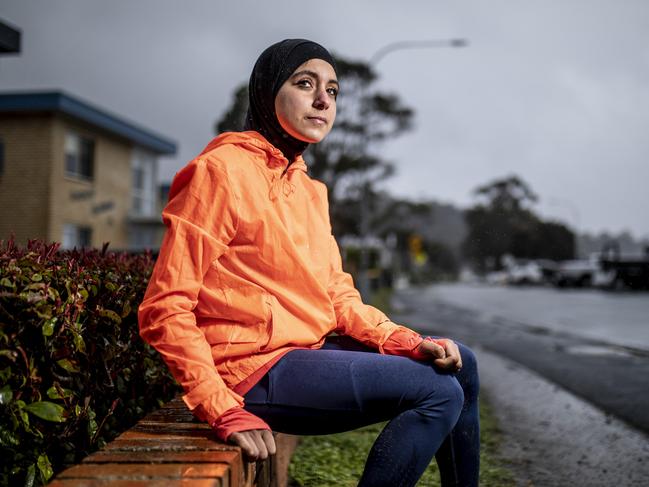
Daoui struggled with depression and anxiety and eating disorders as a teen and while bullying was not the sole cause, she believes it was definitely a contributing factor.
One of the ways she has helped manage these health conditions is running.
Daoui is one of Tasmania’s finest distance runners, with a string of impressive titles to her name. She is a regular competitor in local events such as the City to Casino, Run the Bridge and Burnie 10 fun runs, and she will line up for Sunday’s Point to Pinnacle, the sixth time she has competed in the gruelling 21.1km uphill event.
She also has her sights on the Melbourne Marathon next month and the Cadbury Marathon and Run the Bridge early next year.
But perhaps most impressive is the way Daoui has used running as a platform to raise money and awareness for various charities that are dear to her heart.
The Type 1 diabetic, who works as a nurse in paediatrics and oncology at the Royal Hobart Hospital, ran her first marathon at 16 – at Ross – raising more than $5000 for displaced Syrians affected by the civil war. She has since run the Cadbury Marathon twice, raising funds for Cancer Council Tasmania and oncology outpatients at the Royal Hobart Hospital. And earlier this year she ran the Point to Pinnacle course – considered the world’s toughest half marathon – every day for seven days to raise more than $12,000 to support Tasmanians with childhood cancer through the Tim Blair Run For Kids Foundation (timblairrunforkids.org).
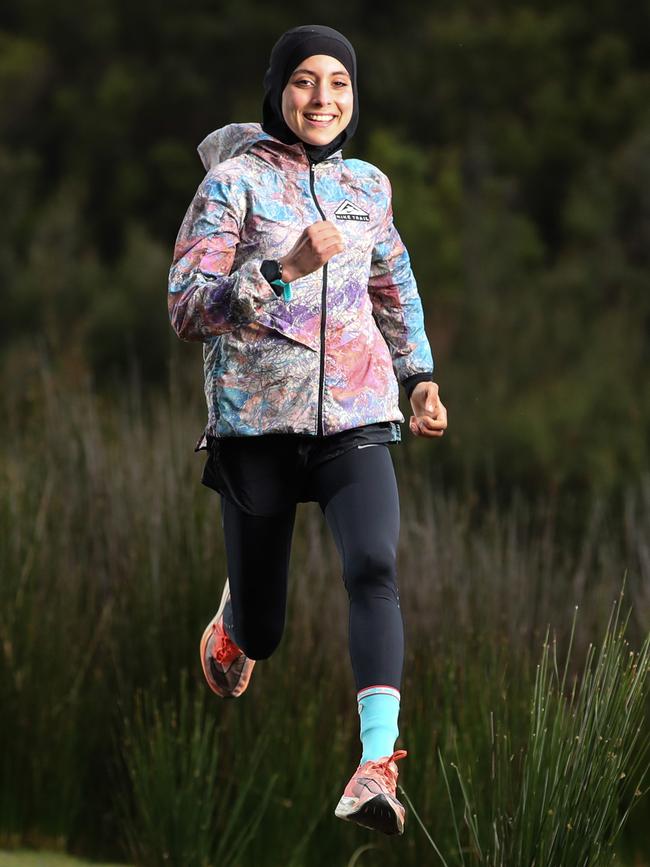
Daoui named it the Everest Challenge because if she was able to complete the 21.1km course from Wrest Point to the top of kunanyi/Mt Wellington each day, by the end of the week the elevation gained would be higher than Mt Everest.
And although she is a multiple winner of the Point to Pinnacle event, Daoui says she had never attempted a task of such magnitude.
But she says her struggles as a runner were insignificant compared to the struggles faced by sick children and their families. And she hopes the feat served as a symbol of hope.
“The Everest Challenge doesn’t compare to the real difficulties and hardships that families and children have to undergo,’’ Daoui says.
“But for me, mentally, when I was [running up the mountain] it felt like I was actually doing something towards helping those people who are going through challenges.
“The sick kids and their families is what was on my mind to help me through it.
“It was an amazing experience … I wanted something that would be difficult, I wanted something that would challenge me physically and mentally.
“And I absolutely love kunanyi/Mt Wellington – it’s a very iconic area in Tasmania. It means a lot to me to be able to contribute.’’
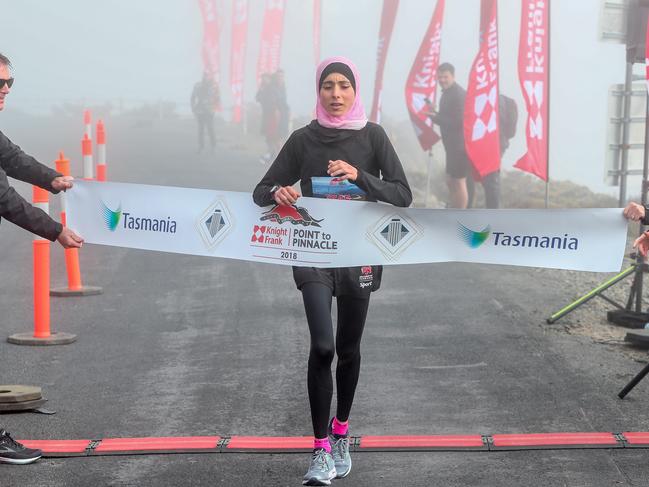
Listening to Daoui speak about her achievements and her struggles it is clear she possesses a maturity far beyond her 22 years.
And it’s also hard to believe that she never thought she’d be any good at running, until a friend convinced her to sign up for a fun run at high school.
“It started back in Grade 8 – my friend at the time was into running and she encouraged me to sign up to do the City to Casino,’’ Daoui recalls.
“I had never run a fun run before and I was a bit hesitant and unsure about it.
“But I thought there’s no harm in trying. So I signed up and I absolutely loved it.’’
She also realised she had a talent for running.
“I surprised myself, I didn’t think I could run seven kilometres,’’ Daoui says.
“So after that I started more runs and signed up for cross country events and things like that.’’
Daoui was diagnosed with Type 1 diabetes when she was eight, so she has also used her platform as a runner to show others that, with proper management, diabetes doesn’t have to be limiting.
“One message I want to send out to other Type 1 diabetics is don’t let your condition cause limitations on what you want to do in life,’’ Daoui says.
“Anything is possible.’’
She believes that her diabetes diagnosis, followed by her mental health struggles as a teenager, ultimately led her to become a medical professional.
“Being diagnosed and then meeting other nurses and doctors and being in that clinical setting and getting that help and support definitely inspired me to pursue nursing,’’ she says.
“It’s such a rewarding career, I’m very grateful to be able to work in a field where I’m able to help others.’’
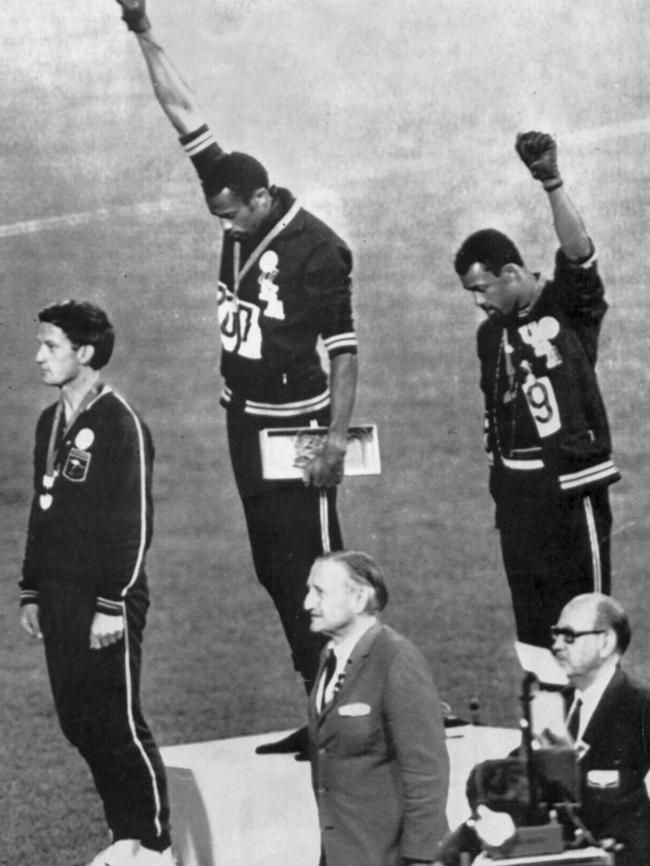
Her passion and dedication to helping others has not gone unnoticed, with Daoui announced as the recipient of the 2021 Peter Norman Humanitarian Award last month.
Awarded each year on October 9 to honour the legacy of famed Australian sprinter Peter Norman, the award is given to a member of the Australian athletics community who exemplifies the spirit of Peter Norman through human rights or humanitarian causes.
Daoui says it was a shock and an honour to receive the award, which was launched in 2018 by Athletics Australia and has previously been won by Eloise Wellings – founding director of Love Mercy, an organisation empowering rural communities in Northern Uganda to overcome poverty caused by the horrors of decades of civil war – and high profile runner Robert de Castella who established the Indigenous Marathon Project, which uses running to celebrate Indigenous resilience and achievement and create inspirational Indigenous leaders.
“It is a great honour to be awarded the Peter Norman Humanitarian Award,’’ Daoui said at the time.
“Not only was Peter one of Australia’s greatest sprinters, he was also an advocate for human rights who spoke out against racism which I believe is one of the greatest attributes a person can have.
“His legacy in athletics and advocacy is truly inspiring and I hope that as a community we can use his legacy to make a stand in creating an inclusive environment in both sports and society.”
Always humble, Daoui says she could not achieve such successes without the support of the wider community.
“These fundraising events would not have been possible without everyone else’s contributions, it’s definitely a collective effort,’’ she says.
“I may have had the idea but it wouldn’t have actually happened if no one else stepped in and supported me.’’
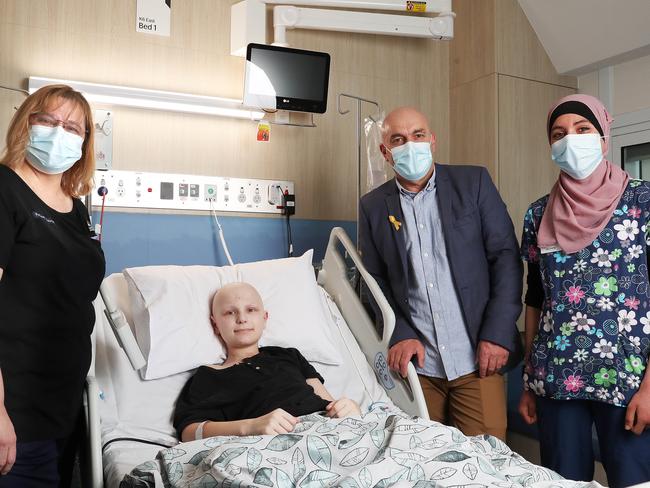
Daoui says her own life story has definitely influenced her philanthropic work.
“Much of my work comes from wanting to give back to society and to help causes close to my heart,’’ she says.
“I believe we can all contribute in making the world a better place.
“My personal experiences have played a role in the charity work that I have done, and that includes having experienced the effects of racism during my early teenage years when I first moved from Sydney to Tasmania. I was able to receive support during those years, and I’d like to thank those who helped me at my most vulnerable as they have contributed to becoming the person I am today.
“I have also witnessed the effects of how raising funds for our healthcare system can improve the quality of life of patients and their care. As a nurse in oncology and currently working in paediatrics, I felt that I could use my running to help raise much needed awareness and funds for cancer research and treatment.
“It means a lot that my own experiences can be used to help others.
“I personally draw inspiration and insight from others as I believe that shared knowledge and experiences can help shape us to become better people.”
Daoui, who is a member of the Northern Suburbs Athletics Club and also trains with running coach David Davis-Jones, runs about 12-14 hours a week, which she fits in around her shift work at the hospital.
She can regularly be seen running at Kingston Beach but some of her other favourite spots include Tinderbox and the Pipeline Track.
And of course she’s a regular on Tasmania’s fun run and marathon circuit.
“My intention, when I’m out in the race, is not to compare myself to other competitors and not to see how fit I am, it’s just the joy of running, and knowing that it’s such a blessing in my life,’’ Daoui says.
“I’m just out there and having fun.’’
She also enjoys celebrating the successes of her fellow runners.
“I have my good days and my bad days and not every run is a win,’’ Daoui says.
“But I also really enjoy seeing other runners be able to beat their personal bests and win, I like the shared enjoyment of running.’’
Daoui admits her hospital work can be quite full-on, so running is the perfect antidote.
“The number one reason why I run is self care for me and being outside in nature and being grateful for another day,” Daoui says.
“And having a break from everything – from work, from family life.
“The social aspect of being able to run with friends and other groups is really great as well.’’
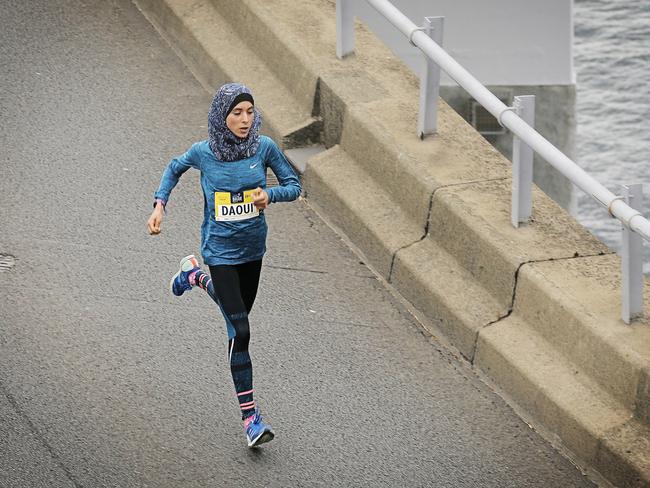
She says running has also helped her get through her various health struggles and she is in a good place right now.
“Running has been so, so vital for my recovery, especially with depression and anxiety and everything else, it’s helped so much and opened so many doors for me,’’ Daoui says.
“In saying that, of course there are days that are very hard for me as well … there are ups and down but I’m definitely in a better place than I was before.’’
She says over the years she has received a lot of support and has developed a toolbox of helpful strategies to better manage her mental health.
She draws on her own experiences to help patients who are facing similar struggles.
“Just having that empathy and understanding and just being able to sit with them and being there for them is really important,’’ she says.
“Every single person has a different and unique experience but just acknowledging or being there for someone who might be struggling is really, really helpful.
“It’s really rewarding being able to help patients who are going through struggles that I went through previously and giving them that hope that things will get better.’’
Daoui says a lot of young patients are shocked to discover that their confident and competent nurse once faced such challenges and are reassured that there is light at the end of the tunnel.
“I tell them to focus on the long-term goal,’’ Daoui says.
“Right now it’s really, really hard but them putting in effort is going to help them and these moments do pass.’’

Daoui remains in contact with her extended family in Morocco and has fond memories of her time there before moving to Australia when she was four.
“I was actually there before the pandemic started in 2019 – I was very lucky to have seen my family before everything went crazy,’’ she says.
Her dad, a builder, secured a job in Australia which is why they moved to the other side of the world.
Her dad built the Kingston house that the family lives in, while her mum runs a family daycare business and her three younger siblings – sisters Fatima, 15, and Yosra, 14, and brother Anas, who is 11 – are all at school.
Daoui says bullying and racism at school did make life difficult when she was younger.
“It was something that I really struggled with and may have contributed to a bit of trauma and may have led to me later on developing depression and anxiety and eating disorders,’’ she says.
“I’m not saying that was the only thing, but it definitely may have contributed to that.’’
But she also believes that there has been a huge shift in community attitudes since that time, and says she has also been shown immeasurable kindness by fellow Tasmanians.
“I have learnt that just because there’s a small percentage of people who are negative, that we shouldn’t let them be the focus,’’ Daoui explains.
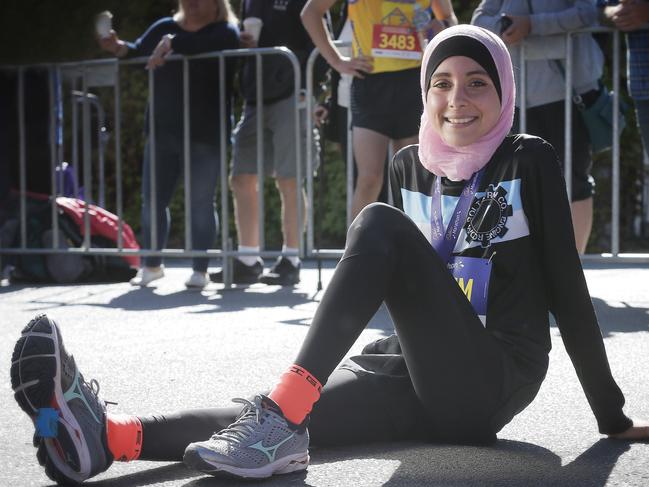
“I have received some amazing support over the years, from amazing people who have really respected me for who I am and my identity as a Muslim.
“There’s definitely been a massive shift … people are definitely more informed and more educated and more open-minded which is what we need – we need to be more accepting of others.’’
Daoui says people still have similar hopes, dreams and fears, regardless of their religious beliefs or cultural identity, and she hopes she has helped shatter some stereotypes through her running and charitable work.
“We’re all human at end of the day, we’re all blood and bone,’’ she says.
“No one deserves to be discriminated against. At the end of the day I’m Meriem … I’m just trying to do my best and being a Muslim is part of my identity.’’

Add your comment to this story
To join the conversation, please log in. Don't have an account? Register
Join the conversation, you are commenting as Logout
Old money or new cash … how would you wear your luxe sedan?
There is now new ‘entry-level’ access to the world of success and luxury with the Mercedes-Benz E200.
Should kids stand up to bullies? Why this expert says no
Students who intervene when they witness bullying could be causing more harm than good, with new research challenging everything schools teach about bystander intervention.